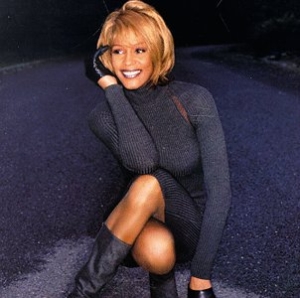As unfair and, frankly, unnecessary as it is to pin Whitney’s ruination on her ex-husband, the fact that Houston’s voice was a cracked shell of its former glory became apparent in live performances following the release of what turned out to be her final album. The album itself wasn’t bad, but it’s hard to hear a song like “I Didn’t Know My Own Strength” right now.
“I Didn’t Know My Own Strength” (2009)
I came late to loving Whitney Houston. I was in junior high when she released her first two albums. By that time, I was becoming less interested in what was playing on the Top 40 radio and more so in what Kevin Seal was playing on 120 Minutes. Besides, Whitney was a “VH-1 artist”, which, in the 80s, meant approximately that her music was for grown-ups. My mom bought her CDs. I avoided them. Or tried to. But how could one have possibly avoided “I Wanna Dance With Somebody” in 1987? Or “How Will I Know”? Or “So Emotional”? Or any of the other 11 songs she sent to #1 in the first ten years of her career?
It wasn’t until I saw Whitney Houston performing the title track of her 1998 album My Love Is Your Love on the American Music Awards with Wyclef Jean (who wrote and produced the track) that I was finally able to open myself up to loving Whitney’s music. What I remember more than the song itself in that performance was the uncontainable joy Whitney brought to it. (It reminded me of an old In Living Color sketch called Whitney Houston’s Rhythmless Nation – a hilarious re-imagining of the Janet Jackson “Rhythm Nation” video with Houston replacing Janet, Houston’s wild movements knocking over the lockstep military back-up dancers around her.) I was a Whitney-hater no longer. I bought the album the next day.
Whitney Houston at the American Music Awards
I eventually went back and bought all of Whitney’s albums – the ones my mom loved when I was a kid, the 90s movie soundtracks, and later, I bought the 2002 flop Just Whitney on the day of its release. (I still think “Love That Man” should have been a bigger hit!) I eventually saw The Bodyguard. And The Preacher’s Wife. I retroactively picked up 12″ singles of “Love Will Save the Day” and “How Will I Know”. I finally learned to stop worrying about “alt-cred” and learned to love those big ballads – not just “One Moment In Time” and “Saving All My Love for You”, but album cuts like the gorgeous “Just the Lonely Talking Again” from her 1987 album Whitney.
“Just the Lonely Talking Again” (1987)
The thing about Whitney is that in an age where pop stars reinvent themselves for every new album, every new single, every new video; in stark contrast to the other pop icons of her time, and maybe in stark contrast to what was going on her personal life, Whitney’s pop persona remained fairly constant and steady. Her voice was strong. Her phrasing was extravagant. One of my friends derisively noted that she didn’t sing words – she sang notes with words attached to them. I think there’s some truth to that, but so what? She scarcely needed words. She had a voice. She could tell stories and she could preach sermons with her vocal dynamics alone.
Listen to the way her rendition of “I Will Always Love You” builds from a whispery a capella contemplation to its iconic final declaration of love, and tell me you need to speak English to understand what’s going on in that song. It’s easy to get trapped into choosing between loving Dolly Parton’s original (which is deeply heartbreaking in its own right) and loving Whitney’s performance. I don’t think this is a mutually exclusive choice, but it seems to me that, while they’re both great performances (and props to Parton for the words and music), Whitney’s version is, for better and/or worse, more universal.
“Love That Man” (2002)
Whitney was not a costume-changer. She sang songs as herself. When you hear a Whitney Houston song, it feels like she’s letting you into her life a little bit. As RuPaul might have said, she always brought the Whitney realness. Even in her movies, you got a sense she was playing a version of herself, however idealized. She could be unabashedly dorky (see her video for “How Will I Know”). She could be deeply corny (see her cover of “The Greatest Love of All”). She could be your sweetest pal (see “Exhale”), and she could play the tough, wronged woman like no one’s business (see “I Learned from the Best”). But she was always “Just Whitney”.
She wasn’t a lip-syncer either. So when it came down to promoting her last album, she let her broken-ness show in ways that she probably didn’t intend to. At a time when the industry and the audience might have accepted an Autotuned diva doing live performances backed by vocal-doubling tapes, Whitney had the courage to, y’know, sing. In doing so, she demonstrated her frailty and her ruin, and was rewarded for it with punchlines.
“I Learned from the Best” (1999)
In 1998, Whitney sang “If tomorrow is Judgment Day, and I’m standing on the front line, and the Lord asks me what I did with my life, I will say that I spent it with you.” Even then, it seemed a love song to her audience. Thanks, Whitney, for sharing your life and your talents with us.

